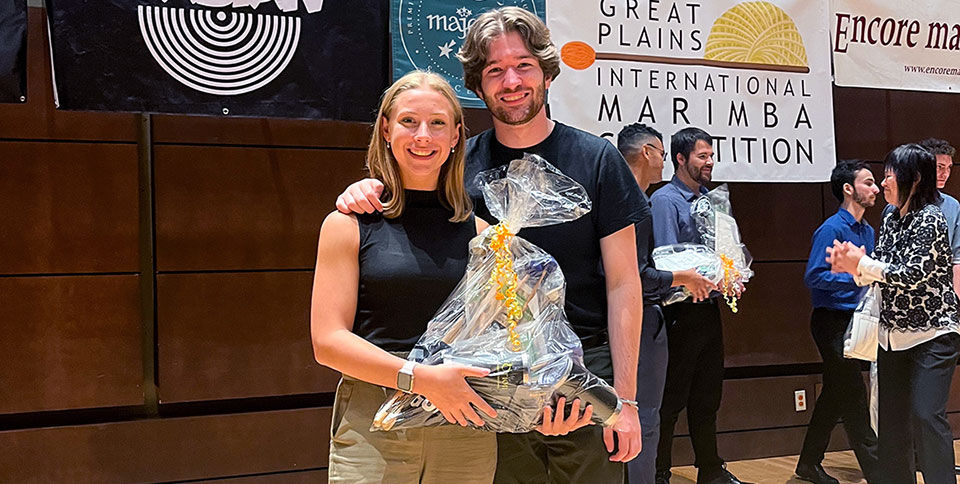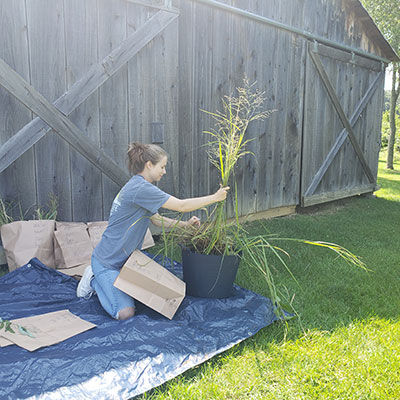Highlander Highlights: Week of August 21, 2023
Radford students score big in international competition
By Sean Kotz, College of Visual and Performing Arts Communications Officer
A pair of Radford University sophomores, music majors Meridythe Witt and Ian Epperly, rose through stiff competition at the Great Plains International Marimba Competition this summer to bring home third-place honors in the open duo category.
The pair have performed as the Meridian Percussion Duo, a moniker combining their two first names, since 2021. They have mastered some of the hardest pieces of music written for two marimbas, enabling them to move through the semifinals and into the finals.
The Great Plains International Marimba Competition was founded in 2013 and takes place each year in Oklahoma City through the Oklahoma Modern Music Collective. This competition attracts some of the most talented young professionals and college students in the world.

From left: Meridythe Witt and Ian Epperly.
It is the first time Radford students have participated in the contest, making the third-place showing more impressive. However, the students say the competition is only part of the equation.
“We wanted to take our musicianship to the next level,” Witt explained. “This kind of internationally renowned competition enables us to grow alongside the best musicians of our generation.”
“We got to compete against other students from top music schools and professionals from across the country and the world,” Epperly added, “and made many lasting friendships and connections.”
Epperly and Witt cite the training, support and encouragement of the Radford University percussion professors Robert Sanderl and William Newton as a critical element in their success.
It was Sanderl who initially brought them together.
“When Meridythe and Ian arrived as freshmen, I immediately found them to be both gifted and driven,” Sanderl said. “So, I suggested they play a duet for two marimbas that we worked extensively during their first semester and was later featured in their performance in Oklahoma.”
Over the next two years, Sanderl and Newton continued working extensively with the pair and guiding them to advanced compositions. One of the pieces they presented was specifically written for this competition, and in many cases, they were competing against older, more experienced musicians from music conservatories.
Newton says he is very proud of the Meridian Percussion Duo.
“To prepare such a demanding program, compete against duos from prestigious universities and conservatories and to win third place is a testament to their incredible work ethic and dedication to the craft,” he said.
Sanderl agreed.
“I am immensely proud of them and inspired by their musicianship and passion. It is an honor to be their teacher and consider it a gift that they allow me to be part of their journey."
Jamori Harris ‘knocked it out of the park!’
Nearly 23,000 people gathered at the ballpark in Washington, D.C., on Friday, Aug. 11, to root, root, root for the home team Nationals as they squared off against the Oakland Athletics. Before the first pitch was tossed, Radford University senior criminal justice major Jamori Harris treated the exuberant fans to a rousing rendition of the national anthem.
“It was amazing and scary at the same time,” Harris said. “I was truly, for the first time, nervous performing in front of a crowd that big.”
Each summer, the Radford University Alumni Association partners with the Nationals as part of the major league team’s College Day Series, which includes a full program of events and a limited-edition Radford/Nationals co-branded giveaway.
When presented with the chance to sing the anthem, Harris jumped at the opportunity.

Criminal Justice major Jamori Harris is shown on the Nationals Park videoboard as he performs the national anthem on Aug. 11, 2023.
The uber-talented vocalist has been singing in church choir since he was 8 years old. In high school, he made all-state chorus during his junior and senior years. As a Highlander, he has performed with the Radford Singers – “and enjoyed every minute of it,” he said – and sung the national anthem and the alma mater at various campus events, including commencement ceremonies.
Growing up in Louisa County, about a two-hour drive from Nationals Park, Harris is a fan of the local ball club and has enjoyed going to their games with family and friends. However, on this night, at least before the game began, Harris was dialed into his on-field performance.
“Honestly, I was so focused on singing that I did not take the time to meet the players,” he confessed.
According to those in attendance and a Radford University Alumni Association Facebook post, Harris stepped up to the microphone and “knocked it out of the park!”

Predicting decomposition in drylands
Assistant Professor of Biology Steven McBride recently published a paper, “Soil-Litter Mixing Mediates Drivers of Dryland Decomposition along a Continuum of Biotic and Abiotic Factors,” in the academic journal Ecosystems.
The paper stemmed from McBride’s work using “a suite of molecular and ecological tools to understand how soil microbial communities drive ecosystem functioning,” he explained.
McBride conducted his research in the Sonoran Desert in the southwestern United States, collaborating with researchers from the University of Arizona, Arizona State, the University of Kentucky and Loyola University.
The researchers’ goal, McBride said, was to determine to what extent UV radiation and soil microorganisms contribute to the decomposition of plant material.
“Decomposition is an integral process for recycling nutrients in soil ecosystems,” McBride explained. “However, our understanding of how this process works in arid ecosystems is lacking, and current models fail to accurately predict decomposition in these systems.”
The Radford biology faculty member determined that the shift between abiotic drivers, such as UV, and biotic drivers of decomposition, such as fungi and bacteria, is mediated through the process of soil litter mixing.
“This means that as leaves fall to the soil surface in arid environments, that the initial decomposition is mostly driven by abiotic factors such as UV and temperature,” McBride said. “However, as wind and water cause the leaves to be covered with soil, the native soil microorganisms are able to colonize the leaves because the soil helps shield the microbes from harmful UV radiation and retain the scant moisture found in this environment.”
The research, McBride said, will help soil ecologists and climate scientists more accurately predict decomposition in drylands, “which is of increasing importance as drylands are expected to expand globally due to climate change.”
In the meantime, McBride is actively recruiting Radford students to work on local lab and field experiments. Currently, his students are determining the effects of disturbance and nutrients on plant and soil community dynamics and the role of soil microbes on plastic decomposition.
From our faculty experts: Why finding ice on the moon could be a ‘game-changer’
India’s Chandrayaan-3 landed near the moon’s south pole on Wednesday, August 23, 2023, making it the first spacecraft to touch down in that lunar region. Part of the importance of the robotic vehicle’s two-week mission is to explore signs of ice. Why is this important? Professor of Physics Rhett Herman, Ph.D., who teaches astronomy and operates the Radford Planetarium, explains:
“When we explore space, water is an essential commodity. And, it’s a deal-breaker – if we don’t have it, we die. In addition to drinking, we can also make oxygen to breathe from it. We know from past satellites, and even Earth-bound observations, that there is some amount frozen water on our moon, and it’s most concentrated at the polar regions. The south geographic pole of the moon seems particularly amenable to having water ice. If it’s there in large enough amounts to consistently extract and use, then we have the capability of establishing a permanent crewed presence on our moon. Due to its lower gravity, our moon is the obvious best stepping stone to deeper exploration of our solar system. Having water (ice) there would be a game-changer.”